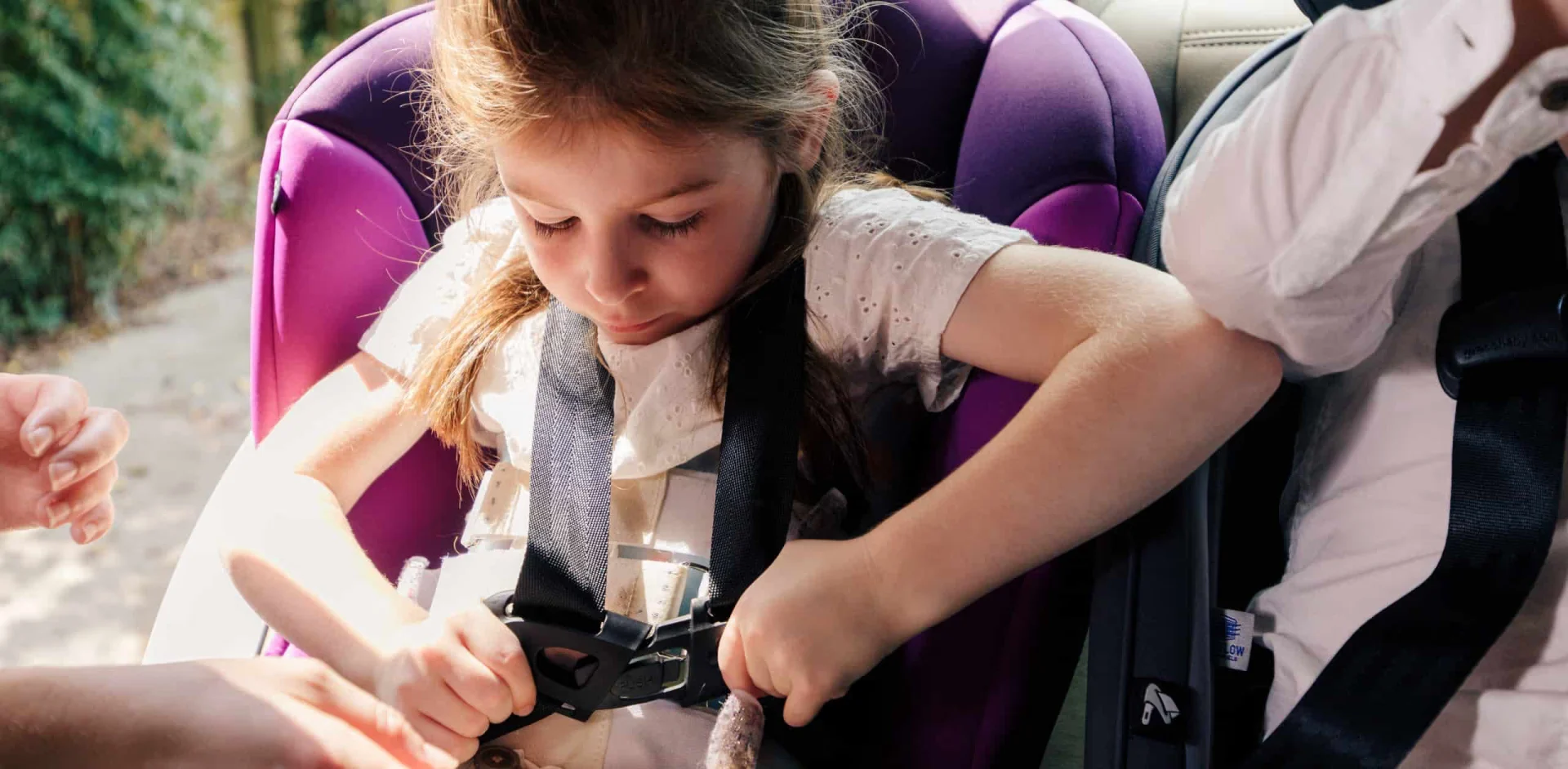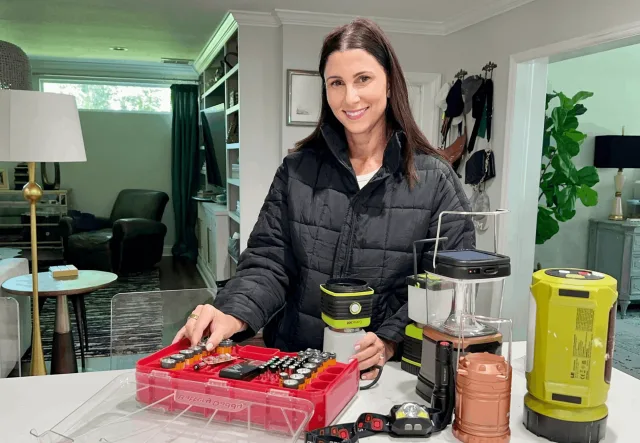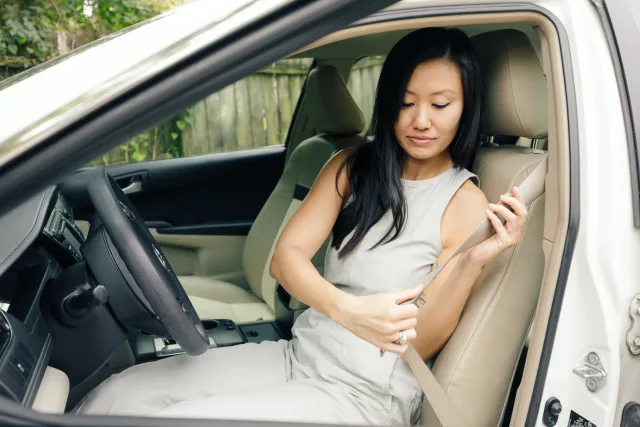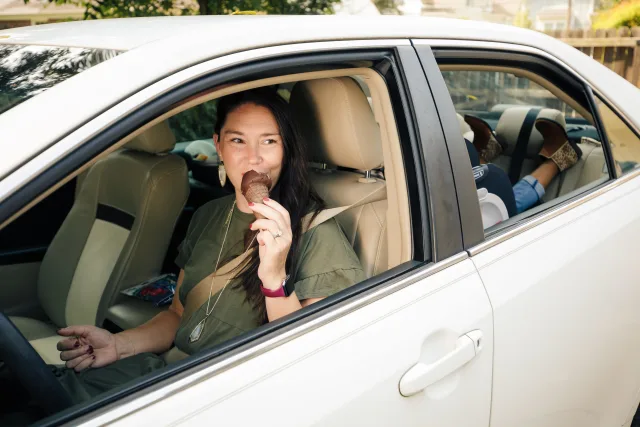Beep beep—it’s that time of year again! Whether you drive one kiddo to school on your way to the office or carpool the entire neighborhood, Car Line Season (also known as “Hurry-Up-and-Wait Season”) waits for no one.
Here are some tips to ensure your elementary kiddos are riding through car lines safely and securely this school year.
Car Seat Safety: Where Do We Draw the (Car) Lines?
1. Kids should ride in a five-point harness until at least age 5.
“Age 5? Are you kidding me?” Nope. You’ve heard this one from me quite a bit, so I’ll keep it simple. A five-point harness keeps wiggly children in a safe position the whole drive—and I surely don’t know many under-five kids who can be trusted to sit properly without that harness. So, ideally, use that harnessed car seat until your child reaches its maximum height or weight limit. Check your car seat manual for graduation guidelines specific to your little’s seat, and don’t be tempted to take that harness away before your child can handle seatbelt-level responsibility!
Quickness in the carpool line is not a reason to prematurely move your elementary schooler out of the harnessed stage. If your kiddo needs help unbuckling, check out the UnbuckleMe car seat buckle release tool. It’s a great tool for those kiddos that aren’t quite ready for booster responsibility but can handle the responsibility of getting themselves in and out. Practice using it in low-pressure situations before that first day of school!
2. For high-back booster riders, make sure the seat belt is positioned properly.
High-back boosters are the first step to teaching our littles how to use an adult seat belt (teaching being the keyword here). Parents often breathe a sigh of relief when we move to the booster stage—but proceed with caution! Moving from a five-point harness to an adult seat belt is a major adjustment. Harnesses restrain our children’s movements, keeping them properly positioned — but seatbelts allow a whole lot more freedom of movement, and with that freedom comes great responsibility!
A booster’s job is to boost your child up, allowing the adult seatbelt to protect their kid-sized body. Easy enough, right?! Well, not quite: you still need to make sure your booster is adjusted to ensure the ideal seatbelt fit. The shoulder belt guide should sit just above your child’s shoulder, letting the seatbelt sit centered on the collarbone before crossing the chest. And at the armrests, make sure the lap belt and shoulder belt are both placed correctly. Usually, both the shoulder and lap belt should be routed under the booster’s armrests, but there are a couple of exceptions! And that lap belt should be pulled snug and sit low across the hips, touching the upper thighs.
Once you have the fit nailed down, it’s time to train your child to sit upright and wiggle-free for the entire ride! Start with short trips or frequent reminders to help your child handle their newfound responsibility. Oh, and here’s another tip: prepare for fast-moving school pickup lines ahead of time. Give your child lots of time to practice buckling their booster independently before they’re in the middle of that car line rush!
3. Slow downnnn on that trip to no-back booster town.
No-back boosters are the last step in your child’s car seat journey. But don’t rush to get to the end! Just like with rear and forward facing harnessed stages, it’s best to let your child outgrow their high back booster before they move on to the next step. With a structured shoulder belt guide, better postural support, and a comfy headrest, high back boosters can help younger or smaller booster riders stay in a safe position for the whole ride. Go ahead and leave that high back in the car until it’s outgrown! Save the no-back booster for the very final stretch of your child’s car seat progression, around age eight and beyond.
4. Kids should pass the 5-step test before riding without a booster—
—and are typically at least 4’9″ (between the ages of 10-12) before they graduate to an adult seat belt. “Why?” Because adult seat belts are for adults. We all want to be the cool parent who lets our kids do the “cool” things their friends are doing, but at the end of the day, would you rather your kid be safe and alive or “cool” and … well, you get the picture. Kids who leave their boosters behind before they fit safely without them, well, they’re at risk for really serious injuries or worse. To counteract their newfound “uncool”, ultra-safe vibe, buy them those popular new sneakers. But keep that booster until they pass the 5-step test. Don’t worry, it’ll be here before you know it (and soon after, they’ll be the ones driving).
5. On that note, the front seat is for teenagers.
While our kids may like to think they’re adults (eye roll), their undeveloped bones and muscles are not ready for the impact of a 200-mph airbag. Airbags are intended to protect the developed bones and muscles of adults; they can actually kill our children. So goodbye 12, hello 13-year-old’s birthday present—shotgun! Welcome to your teenage years. Current parents of teenagers probably wish they could keep all the other fun that comes with raging hormones in the backseat for much, much longer too.
When your child can pass this 5-step test and they reach the appropriate age requirements, they can start riding in the front. Here’s the 5-step test that will help you determine when your child is ready for this next step.
6. If the car is moving, your child should not be.
I know it’s tempting to get a head start. We’re all in a hurry (somehow, always, every time), and we’re practically halfway into the house by the time we put the car in park, but make sure those kiddos stay properly buckled until it’s their turn to hop out. Car moving? Passengers buckled.
7. When it’s time for pickup, don’t drive away until all kids are seated and buckled in properly.
Before school even starts, spend some time practicing fast, safe buckling. Whether your kids are in harnesses or boosters, they’ll need to be efficient under the pressure of teachers urging cars to move up, move up, move up! Save yourself, and your kids, stress on the first day of carpool by giving them low-pressure practice before the first day of school. Older harnessed kids can usually squeeze their arms into an already-tight harness, skipping the difficult step of tightening their own straps. Booster riders should practice the skill of finding the buckle quickly, which can be a tough task especially if their booster is right next to a sibling’s seat. Once these important tasks become muscle memory, pickup line will be a piece of cake!
In a worst case scenario, if school staff insists on keeping the line moving and there just isn’t time to get everyone settled, then slowly pull into the closest parking spot. Make sure your kids are safely buckled before you leave the school lot. Crashes can happen anytime, anywhere — even as you turn out of the school to head home. It’s not worth the risk!
8. If any child is riding in your car, you’re responsible for their safety.
Are you that parent caravanning the whole neighborhood? (Currently sending your award to be engraved.) Before neighbor kiddos hop in, determine all safe seating positions in your vehicle and purchase additional car seat safety devices that you know you’ll need to accommodate them. Don’t want to buy them? Let the parents know they need to provide the stage-appropriate car seat for their kid before you agree to shuttle them around. As the driver (and adult), every kiddo in your car is under your wing. Think about how you’d want someone else to travel with your child and do exactly that. Plus, a little extra, just in case.
Whew! Feel like a pro yet? With a million ever-changing car seat safety rules, it’s impossible to know it all, all the time. But, good news—I’m doing my best to learn it all, and I’m on this journey with you.
The reality is your child will need some sort of safety device until they are 10-12 years old, maybe longer. Take the guesswork out of graduating from one seat to the next with our Car Seat Progression eBook. From baby to big kid, feel confident and safe at every stage.
If you’re looking for a new seat, head over to our Car Seat Buying Kits for more info on selecting the right stage for your kiddo. And make sure you are following along on Instagram for fun, free content too!
Happy school days, mamas!
Affiliate links are included above. Safe in the Seat earns a small commission when you purchase through these links with no cost to you. We so appreciate your support.






